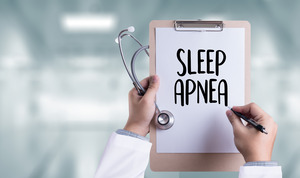5 Sleep Apnea Myths That You Shouldn’t Believe
August 13, 2023

It’s estimated that out of the millions of people with sleep apnea in the United States, as many as four out of five remain undiagnosed. If you want to give yourself the best chance of having your sleep apnea caught and treated as soon as possible, you need to make sure that you’re properly informed about the disorder. Below are the facts behind 5 all-too-common sleep apnea myths.
Myth 1: Snoring Always Means That You Have Sleep Apnea
The majority of people with sleep apnea have a tendency to snore loudly. But while snoring can be a major symptom of sleep apnea, it’s not always a sure sign that you’re suffering from the disorder. Your bed partner may be able to describe your snoring to you; if it’s particularly loud and is often accompanied by notable pauses in your breathing, it could mean that you’re suffering from sleep apnea. It’s best to seek out a sleep test if you have any doubts.
Myth 2: Only Men Can Suffer from Sleep Apnea
While sleep apnea does tend to occur more often in men, women can develop it as well. However, it should be noted that women tend to suffer from different symptoms than men; for example, they may experience insomnia, morning headaches, or a lack of energy during the day. Because women experience sleep apnea differently, many of them don’t recognize the warning signs and thus may not realize when they need to seek diagnosis and treatment.
Myth 3: Sleep Apnea Can Only Occur in People Who are Overweight
It is true that most people with sleep apnea are also overweight. However, weight is far from the only risk factor for the disorder. If you have a thick neck or an unusually thin airway, you could be more susceptible to interruptions in your breathing. Even if you are of average weight, it’s important to keep an eye out for potential warning signs of sleep apnea.
Myth 4: Alcohol Can Help When You’re Having Trouble Sleeping
Some people use alcohol as a sleep aid, but this is counterproductive – especially if you already have sleep apnea. The truth is that alcohol can prevent you from spending enough time in the REM stage of sleep, which can have a severe impact on the quality of your slumber. Furthermore, alcohol tends to have a relaxing effect on the throat muscles, making them more likely to block the airway and cause sleep apnea episodes.
Myth 5: Given Enough Time, Sleep Apnea Will Eventually Go Away on Its Own
It can be tempting to think that your sleep disorder will resolve itself given enough time. Sadly, this is far from the case; not only is sleep apnea highly unlikely to go away on its own, but ignoring it could lead to raised blood pressure, heart problems, and other life-threatening issues. You should seek help from a professional as soon as possible if you want to avoid the worst consequences of sleep apnea.
About the Author
Dr. Mark Gerome went to The Ohio State University College of Dentistry for his dental education. He is proud of being able to help patients with sleep-disordered breathing get a better night’s rest. At his Loveland practice, Gerome & Patrice Family Dentistry, he offers oral appliance therapy as a solution for sleep apnea. To schedule a consultation with Dr. Gerome, visit his website or call (513) 677-1349.


